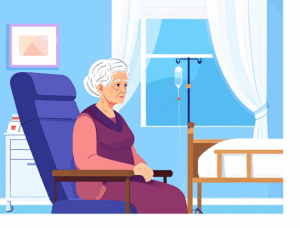Module 1 – Promoting Patient Well-being
Ethics Case 1.4
Ms. Klein’s Cancer Diagnosis
Ms. Klein, 73, was discovered unconscious on a sidewalk and admitted to the ER two years ago. At that time, she was diagnosed with end-stage renal disease (irreversible kidney failure) and was started on hemodialysis. Unfortunately, she had trouble regaining consciousness after that episode and has been unable to effectively communicate ever since. Specifically, Ms. Klein has been unable to offer any information about her medical history or explain what her medical preferences might be. Ms. Klein is effectively non-verbal, relying instead on facial expressions or actions such as grabbing things or pushing them away to communicate any preferences. She is sometimes able to follow simple commands but appears unable to follow complex commands or understand complex information. This means she is unable to understand relevant medical information and cannot make any medical decisions for herself.

Given her inability to effectively communicate or live independently, Ms. Klein was discharged to a local nursing home where she has been residing for the past two years. Despite the best efforts of social work staff, no family or friends have been located for Ms. Klein over the years. When alert, Ms. Klein appears to respond to positive and painful stimuli such as smiling while eating ice-cream or crying out when she’s in pain. With the help of the nursing staff, she has been receiving hemodialysis treatments three times a week. Each treatment requires that she be transferred across town to a dialysis center where she undergoes a four-hour procedure to filter her blood. Dialysis treatments do not reverse kidney failure, but rather act as an artificial kidney to stave off the effects of kidney failure. Without hemodialysis, Ms. Klein would die within a month while her body slowly shuts down due to effects of kidney failure. Death due to kidney failure is often relatively painless.
Recently, Ms. Klein has reportedly become agitated and combative during the transfer process to the dialysis facility. She has also started exhibiting new symptoms including blood in her stool and vomiting blood. Two days ago, she was admitted back to the hospital for examination. Upon admittance, Ms. Klein underwent preliminary non-invasive imaging. After looking at the scans, her attending physician concluded that it was advanced stomach cancer and requested a biopsy for further information. However, because Ms. Klein is unable to consent to medical care, no further steps – including the biopsy – can be taken without someone to consent on her behalf. As an ethics volunteer at this hospital, part of your job includes making decisions on behalf of patients who cannot make decisions for themselves. Now that you have been provided all that is known about her recent medical history, it is up to you to decide what happens to Ms. Klein.
Treatment Considerations for Ms. Klein:
During the consultation you learn that the attending physician is quite certain about Ms. Klein’s stomach cancer diagnosis following a physical examination and the non-invasive imaging, as it is the only diagnosis that can account for all of Ms. Klein’s symptoms. While performing a biopsy isn’t necessary to confirm the stomach cancer diagnosis, it would help to determine the specific type of stomach cancer and the cancer grade (how aggressive the cancer is) which is helpful when narrowing in on the best treatment regime. A biopsy is a minimally-invasive procedure that removes suspected tissue for sampling. To perform a biopsy, Ms. Klein would have to be kept without food or water for 12 hours, then sedated while an endoscope is inserted down her throat and into her stomach so tissue can be removed. The procedure is relatively low risk, but there is risk of damage to the small intestine, the stomach, and the esophagus. A biopsy can also result in trouble breathing, muscle spasms in the larynx, and general discomfort during recovery.
The physician then explains that treating Ms. Klein’s cancer would almost certainly involve chemotherapy and radiation in order to shrink the tumor. However, given the advanced stage of her illness and her other health complications, these treatments are very unlikely to fully cure her cancer and surgery is not an option. In a best-case scenario, these treatments would prolong her life by three to four years and treat the symptoms of her cancer. It is also possible that the treatments would do very little to improve her condition. The side-effects of chemotherapy and radiation often include nausea, vomiting, constipation, fatigue, easy bruising and bleeding, abdominal pain, a compromised immune system, nerve damage, and possible strain on the lung and heart. Chemotherapy would also put additional strain on her already compromised kidneys.
Because stomach cancer is a slow growing type of cancer that can take several years to develop, Ms. Klein could live up to two more years without chemotherapy or radiation. If left untreated, her symptoms would continue to worsen throughout the progression of her disease, slowly increasing her pain and discomfort as the cancer spreads to her other organs. If her cancer is treated, it is likely that she will have to receive chemotherapy and radiation treatments on and off for the remainder of her life, which could be up to four years. Additionally, she would be unable to remain in her nursing home while undergoing cancer treatments and would instead need to be transferred to a nearby skilled nursing facility for the remainder of her life..

